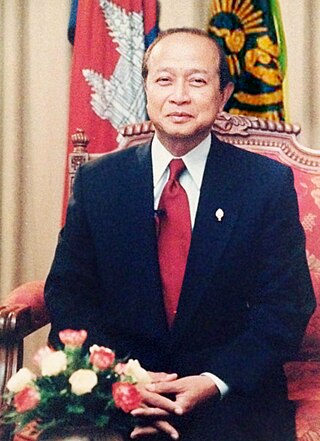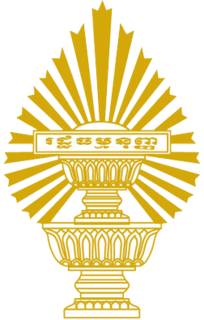| |||||||||||||||||||||||||||||||||||||||||||||||||
1,621 Commune Chiefs 11,353 Commune Councillors | |||||||||||||||||||||||||||||||||||||||||||||||||
|---|---|---|---|---|---|---|---|---|---|---|---|---|---|---|---|---|---|---|---|---|---|---|---|---|---|---|---|---|---|---|---|---|---|---|---|---|---|---|---|---|---|---|---|---|---|---|---|---|---|
| Registered | 7,799,371 | ||||||||||||||||||||||||||||||||||||||||||||||||
| Turnout | 5,293,327 (67.9%) | ||||||||||||||||||||||||||||||||||||||||||||||||
| |||||||||||||||||||||||||||||||||||||||||||||||||
Communal elections were held in Cambodia on 1 April 2007. [1]
| |||||||||||||||||||||||||||||||||||||||||||||||||
1,621 Commune Chiefs 11,353 Commune Councillors | |||||||||||||||||||||||||||||||||||||||||||||||||
|---|---|---|---|---|---|---|---|---|---|---|---|---|---|---|---|---|---|---|---|---|---|---|---|---|---|---|---|---|---|---|---|---|---|---|---|---|---|---|---|---|---|---|---|---|---|---|---|---|---|
| Registered | 7,799,371 | ||||||||||||||||||||||||||||||||||||||||||||||||
| Turnout | 5,293,327 (67.9%) | ||||||||||||||||||||||||||||||||||||||||||||||||
| |||||||||||||||||||||||||||||||||||||||||||||||||
Communal elections were held in Cambodia on 1 April 2007. [1]
| Party | Votes | % | Chiefs | +/– | Councillors | +/– | |
|---|---|---|---|---|---|---|---|
| Cambodian People's Party | 3,148,533 | 60.82 | 1,591 | –7 | 7,993 | +441 | |
| Sam Rainsy Party | 1,303,906 | 25.19 | 28 | +15 | 2,660 | +1,331 | |
| Norodom Ranariddh Party | 419,791 | 8.11 | 0 | New | 425 | New | |
| FUNCINPEC | 277,545 | 5.36 | 2 | –8 | 274 | –1,920 | |
| Other parties | 27,090 | 0.52 | 0 | – | 1 | – | |
| Invalid/blank votes | 116,458 | – | – | – | – | – | |
| Total | 5,293,727 | 100 | 1,621 | 0 | 11,353 | +92 | |
| Registered voters/turnout | 7,799,371 | 67.87 | – | – | – | – | |
| Source: COMFREL | |||||||

The politics of Cambodia are defined within the framework of a constitutional monarchy, in which the king serves as the head of state, and the prime minister is the head of government. The collapse of communism set in motion events that led to the withdrawal of the Vietnamese armed forces, which had established their presence in the country since the fall of the Khmer Rouge. The 1993 constitution, which is currently in force, was promulgated as a result of the 1991 Paris Peace Agreements, followed by elections organized under the aegis of the United Nations Transitional Authority in Cambodia. The constitution declares Cambodia to be an "independent, sovereign, peaceful, permanently neutral and non-aligned country." The constitution also proclaims a liberal, multiparty democracy in which powers are devolved to the executive, the judiciary and the legislature. However, there is no effective opposition to the Prime Minister Hun Sen, who has been in power since 1985. His Cambodian People's Party won all 125 seats in the National Assembly in 2018 after the banning of opposition party CNRP and KNLF. KNLF became a main opposition exiled in Denmark after CNRP was dissolved. Even if the communal election which will be in 2022 and national 2023, there is no international observers such as EU or UN. The government is considered to be autocratic.

Norodom Sihanouk was a Cambodian statesman, Sangkum and FUNCINPEC politician, film director, and composer who led Cambodia in various capacities throughout his long career, most often as both King and Prime Minister of Cambodia. In Cambodia, he is known as Samdech Euv. During his lifetime, Cambodia was under various regimes, from French colonial rule, an independent kingdom (1953–1970), a republic (1970–1975), the Khmer Rouge regime (1975–1979), another communist regime (1979–1989), a state (1989–1993) to finally another kingdom.

The Revolutionary Front for an Independent East Timor is a centre-left political party in East Timor. They presently hold 23 of 65 seats in the National Parliament. Fretilin formed the government in East Timor until their independence in 2002. They obtained the Presidency in 2017 under Francisco Guterres, but lost in the 2022 East Timorese presidential election.

Cambodia, officially the Kingdom of Cambodia, is a country located in the southern portion of the Indochinese Peninsula in Southeast Asia, spanning an area of 181,035 square kilometres, bordered by Thailand to the northwest, Laos to the north, Vietnam to the east, and the Gulf of Thailand to the southwest. The capital and largest city is Phnom Penh.
After the fall of the Pol Pot regime of Democratic Kampuchea, Cambodia was under Vietnamese occupation and a pro-Hanoi government, the People's Republic of Kampuchea, was established. A civil war raged during the 1980s opposing the government's Kampuchean People's Revolutionary Armed Forces against the Coalition Government of Democratic Kampuchea, a government in exile composed of three Cambodian political factions: Prince Norodom Sihanouk's FUNCINPEC party, the Party of Democratic Kampuchea and the Khmer People's National Liberation Front (KPNLF).

Hun Sen is a Cambodian politician and former military commander who has served as the prime minister of Cambodia since 1985. He is the longest-serving head of government of Cambodia, and one of the longest-serving leaders in the world. He is also the president of the Cambodian People's Party (CPP) and a member of the National Assembly for Kandal. His full honorary title is Samdech Akka Moha Sena Padei Techo Hun Sen.

The Cambodian People's Party (CPP) is a Cambodian political party which has ruled Cambodia since 1979.

Kratié, alternatively spelled Kracheh or Kraches, is a province of Cambodia located in the northeast. It borders Stung Treng to the north, Mondulkiri to the east, Kampong Thom and Kampong Cham to the west, and Tboung Khmum, and the country of Vietnam to the south.

Ratanakiri is a province of northeast Cambodia. It borders the provinces of Mondulkiri to the south and Stung Treng to the west and the countries of Laos (Attapeu) and Vietnam to the north and east, respectively. The province extends from the mountains of the Annamite Range in the north, across a hilly plateau between the Tonlé San and Tonlé Srepok rivers, to tropical deciduous forests in the south. In recent years, logging and mining have scarred Ratanakiri's environment, long known for its beauty.

Norodom Ranariddh was a Cambodian prince, politician and law academic. He was the second son of King Norodom Sihanouk of Cambodia and a half-brother of King Norodom Sihamoni. Ranariddh was the president of FUNCINPEC, a Cambodian royalist party. He was also the First Prime Minister of Cambodia following the restoration of the monarchy, serving between 1993 and 1997, and subsequently as the President of the National Assembly between 1998 and 2006.

Cambodia is a one-party dominant state with the Cambodian People's Party in power. Cambodia's legislature is chosen through a national election. The general election is held every five years in the fourth Sunday of July. The Parliament of Cambodia has two chambers. The National Assembly has 125 members, each elected for a five-year term by proportional representation. The Senate has 62 members, mostly indirectly elected.

The Senate is the upper house of the Parliament of Cambodia. It is a legislative body composed of 62 members. Fifty-eight of the Senate seats are elected every six years by the commune councillors from 24 provinces of Cambodia and members of the National Assembly. In addition, the King nominates two senators, and the National Assembly nominates two, ending with a total of 62 senators. The Senate performs its duties as determined in the constitution and law in force. The Senate is chaired and presided by the president, currently Say Chhum of the Cambodian People's Party and assisted by two Vice Presidents.

The National Assembly is one of the two houses (chambers) of the Parliament of Cambodia. It is referred to as the lower house, with the Senate being referred to as the upper house.

The United Nations Transitional Authority in Cambodia (UNTAC) was a United Nations peacekeeping operation in Cambodia in 1992–93 formed following the 1991 Paris Peace Accords. This was the first occasion in which the UN directly assumed responsibility for the administration of an outright independent state, rather than simply monitoring or supervising the area. The UN transitional authority organised and ran elections, had its own radio station and jail, and was responsible for promoting and safeguarding human rights at the national level.

General elections were held in Cambodia on 27 July 2008. The result was a victory for the ruling Cambodian People's Party, which won 90 of the 123 seats.
Ta Veaeng is a district located in Ratanakiri Province, in north-east Cambodia. It is the northernmost district in Cambodia, protruding between Laos and Vietnam.
Malik is a commune in Andoung Meas District in north-east Cambodia. It contains four villages and has a population of 1,440. In the 2007 commune council elections, all five seats went to members of the Cambodian People's Party. The land alienation rate in Malik was moderate as of January 2006.

The Khmer Anti-Poverty Party is a Cambodian political party founded in September 2007. Its leader is Cambodian-American Daran Kravanh.
Ou Chum is a commune in Ou Chum District in north-east Cambodia. It contains eight villages and had a population of 3,090 in 1998. In the 2007 commune council elections, all five seats went to members of the Cambodian People's Party. The NGO Forum on Cambodia reported in 2006 that the land alienation rate in Ou Chum was high.